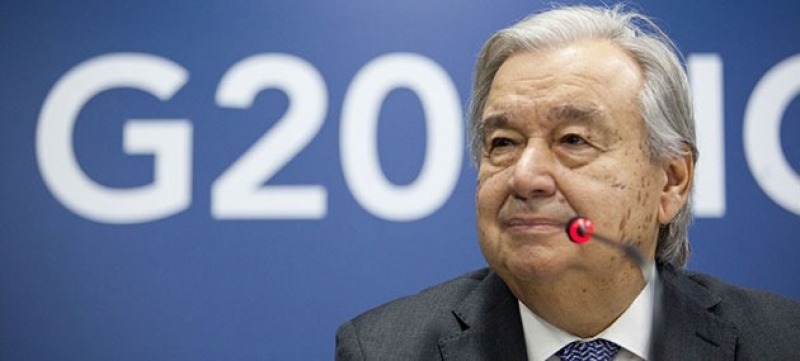- COP 30 ends with delicate Belem Political Package amid drama |
- Khaleda urges all to pray for her amid health concerns |
- Bangladesh embrace agroecology to combat chemical overuse: Experts |
- China warns Japan after ‘red line’ crossed on Taiwan |
- Capital market rebounds on week’s first trading day |
G20 Fails on Debt Crisis, UN Emerges as Alternative Path

UN Secretary-General Antonio Guterres.
When South Africa assumed the G20 Presidency, debt sustainability was placed front and centre, with the promise to launch a Cost of Capital Commission. Many hoped that, with an African country at the helm, the G20 would finally deliver real solutions to the debt crisis gripping the Global South—particularly Africa.
A year later, the South African presidency has concluded, and nothing has fundamentally changed. The G20 has once again failed, and it is time to look elsewhere for genuine solutions.
Africa’s Debt Crisis Deepens
Alarm bells have been ringing for years. Africa’s total debt stock more than doubled from 2021 to US$ 685.5 billion in 2023, driven partly by the economic fallout of the Covid-19 pandemic, with rising costs of capital pushing debt payments to record highs.
The African Leaders Debt Relief Initiative (ALDRI), led by eight former Heads of State, is calling for urgent debt relief—not as “charity” but as “an investment in a prosperous, stable, and sustainable future for Africa and the global economy.”
While South Africa’s presidency raised hopes by placing Africa’s debt crisis at the centre of the G20 agenda, the outcome has leaned more toward rhetoric than action.
G20’s Structural Paralysis
If fair solutions are to be found for the growing debt problems in Africa and other Global South countries, forums like the G20 can no longer be relied upon. Dominated by creditor countries, the G20 is unlikely to reform a system that serves their interests.
After four meetings of G20 Finance Ministers and Central Bank Governors, South Africa issued a debt declaration in October, but it contained no new actionable commitments. The recent G20 leaders’ summit in Johannesburg produced no reform or decisions—only reports. The G20 remains paralysed and unable even to agree on minimum reforms to its Common Framework.
The problem is structural. The G20 is not a truly multilateral or democratic institution, but an informal, exclusive forum for dialogue among competing powers. Geopolitical tensions, particularly in the US context, further entrench this paralysis. Since decisions require consensus, outcomes are often reduced to the lowest common denominator.
Failure of the Common Framework
Launched in late 2020, the G20 Common Framework aimed to enable faster and fairer debt restructuring for low-income countries. Yet it remains inefficient: restructuring is slow, debt reductions too shallow, and responsibility sharing between public and private creditors unequal—as seen in Zambia.
Calls to reform the framework, including establishing time-bound processes, a universally accepted methodology, debt payment suspension during restructuring, and enforceable legal mechanisms, have gone largely unheeded. The G20 continues to serve creditor interests rather than people’s needs.
The UN Offers a Better Path
Fortunately, a more inclusive and democratic alternative exists. In July, UN Member States agreed to launch an intergovernmental process to address gaps in global debt architecture. This initiative is expected to lead to a UN framework convention on sovereign debt and a multilateral sovereign debt resolution mechanism, as supported by the African Union in its Lome Declaration.
The process will also establish a borrowers’ platform, giving debt-distressed countries a coordinated voice in the global financial system. UNDP Director Ahunna Eziakonwa described it as a “common sense and long-overdue” initiative.
However, some creditor countries, including the European Union, are attempting to derail the UN process, arguing it would duplicate G20 efforts. Siding with a clearly failing status quo condemns Africa and other Global South countries to greater poverty, inequality, and climate vulnerability.
If rich nations are serious about supporting Africa and the Global South in addressing climate change and sustainable development, they must endorse the UN-led intergovernmental debt reform process.
The G20 has reached its limits. The world cannot afford another decade of deadlock while debt burdens soar. The time has come to shift the centre of global debt governance to the United Nations.
Theophilus Jong Yungong is Interim Executive Director, African Forum and Network on Debt and Development (AFRODAD), and Iolanda Fresnillo is Policy and Advocacy Manager — Debt Justice, European Network on Debt and Development (Eurodad).

